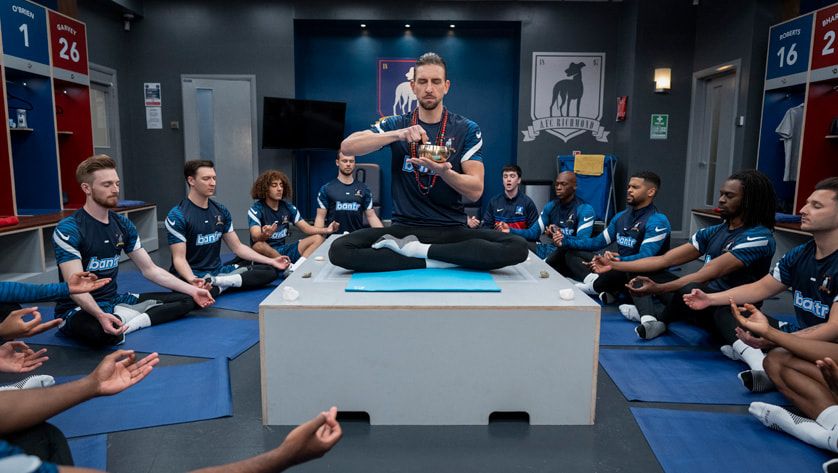How do you solve a problem like ...Zava?

Car dashboards have warning lights. Kitchens have smoke alarms. Railway crossings have loud bells and boom gates. But do I have a system to sound the alarm when anxiety threatens to capture me?
Most often I don't see anxiety sneaking up on me until it has me a headlock. Suddenly I’m withdrawing, reacting, getting more defensive, struggling to make decisions, or in danger of losing my temper when the smallest thing goes wrong. Too often it's only after anxiety relaxes its grip and things calm down a bit that I can notice how I’ve been acting and find enough breathing space to think about what’s been going on for me.
However. We actually do have a system which alerts us when anxiety starts to grab hold.
You’ve probably noticed the signals your body sends. Tight chest. Blank mind. Thoughts that scatter like a dropped bag of marbles. You catch yourself holding your breath. Or you get a headache that lasts for days. You struggle to sleep or engage with those around you.
For me anxiety makes me sweat. And it’s weird. Because often it happens when I’m not even aware of feeling anxious. One minute I’m going about my day. Sitting in a meeting. Making a call. Writing a paper. Giving a talk. Nek minnit.

Did I say weird? I meant GROSS!
But it’s not just our bodies that sound an alarm.
Our behaviour can alert us to anxiety too.
Which brings us to episodes 2 and 3 of Ted Lasso Season 3.

At the beginning of Episode 2 the whole of AFC Richmond is anxious. Fans. Players. Staff. They’ve been promoted to the Premier League but no one thinks they’ll win. Everyone is sure they’ll lose. Which means they’ll drop back down to a lower league.
Enter Zava.

The Greatest (fictional player) Of All Time looks like joining one of Richmond’s flashier rivals. But at the last minute Rebecca swoops in like a seagull hunting hot chips at the beach and convinces him to sign with Richmond. It’s a mighty coup.
And you might expect this would calm things down. But instead all the anxious energy that has been bouncing around the club simply gets directed at Zava.
At Zava's impending arrival...
- Higgins has diarrhoea.
- Ted’s tummy is in knots.
- And the players are gushing as they watch highlights of Zava’s greatest goals.
He moves on the pitch “like a panther”!
“He's like an angel.”
“Why are you downgrading him? He’s clearly a god.”
Even the coaches catch it. Their new strategy can be summed up in just five words:
“Get the ball to Zava.”
It’s as if the whole club now exists for Zava. It doesn’t matter how self absorbed Zava is or how late he runs or how much crap he talks (he talks a lot of crap!). No one ever calls him out. Because he’s Zava. And as he scores miracle-goal after miracle-goal, he single-handedly drags Richmond up from the bottom of the ladder.
And so everyone is dancing to Zava's beat. It's as if the team has been subsumed into Zava. Everyone has given up thinking for themselves and working on their own skills. They've become one big undifferentiated blob with Zava at the centre. It’s all about keeping Zava happy so he keeps scoring goals.

And almost everyone is fine with that. It actually helps them feel better to focus their anxious energy on Zava. Though you can't help wondering - what will happen if Zava stops scoring goals? And even more than that - what is it costing them to direct all their energy at Zava? What are they giving up? What opportunities might they be missing out on?
The key moment in this episode occurs when Ted finally steps back from the Zava-fest and starts to think like a coach.
Ted: Coaching a superstar can't be all, "How do you solve a problem like Maria?"
Richmond has a problem. And the problem isn't Zava. But as long as everyone keeps focusing their attention on him they won't what the real problem is.
So what is Richmond's problem? And how do you solve it?

“How do you solve a problem like Maria?
How do you catch a cloud and pin it down?
How do you find a word that means Maria?
A flibbertijibbet! A will-o'-the wisp! A clown!”
In the Sound of Music, Maria is a tree-climbing, knee-scraping, dress-tearing, all-singing, all-dancing nun who is always running late and who never conforms to the expectations of her Abbey. And the other nuns have had enough of her antics.
“Many a thing you know you'd like to tell her
Many a thing she ought to understand…”
No doubt there are many things they’d like to tell Maria. But instead of speaking to her they choose to sing about her.
Of course we’re all been there. Not the song singing part. The part where we feel so exasperated with someone. Or so worried for them. Or so impressed by them. Or so grateful for their attention. That they become like a magnet attracting all our focus.
But as we direct our energy at them - adjusting and adapting and accommodating ourselves around them - talking about them instead talking to them - walking on egg shells trying to keep them happy - or blaming them behind their backs - we are allowing our functioning to be determined by them. And we are giving up being responsible for ourselves.
What if the problem isn’t Maria?
What if the problem isn’t Zava?
What if the problem is that when a relationship system becomes anxious - instead of meeting the challenge by focusing on how we want to show up - we focus on someone else and how they are showing up?
When we direct our energy at someone - either as the problem or as the solution to our problem - it’s a tell tale sign. Anxiety is getting a grip on us.
It might be:
- Parents worrying about a troubled child
- Colleagues gossiping about a hopeless team member
- Coaches blaming refs for a team's poor performance
- A new employee anxiously monitoring their boss for signs of approval and disapproval
- A manager stewing for weeks over the criticism in their 360 review
- You or me cutting-off from a friend or family member for being “toxic”
These behaviours aren’t necessarily good or bad. But they are anxious.
Which means we’re likely to be reacting instead of thinking. And being buffeted around by others instead of being responsible for ourselves.
- That’s the light on the car dashboard.
- The smoke alarm in the kitchen.
- The bell and the boom gate at the railway crossing.
So…
What has this got you thinking about?
- Who in your life absorbs more of your attention and energy than anyone else?
- Who do you worry most about?
- Talk more about?
- Whose emotions are you most sensitive to?
- Who do you work hardest to keep happy - or to avoid?
2. I’ve noticed that when someone asks me how life is going I tend to talk much more about one particular person in my family and the challenges they are facing than anyone else.
- How might it help me to notice that?
- What kind of questions might it lead me to ask myself?
3. What do you gain by anxiously focus on somebody else? What does it cost you? What could you do instead?
